
Oskar Homolka was an Austrian film and theatre actor, who went on to work in Germany, Britain, and America. Both his voice and his appearance fitted him for roles as communist spies or Soviet officials, for which he was in regular demand. By the age of 30, he had appeared in more than 400 plays; his film career covered at least 100 films and TV shows.
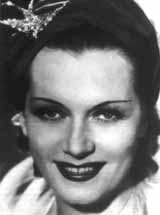
Olga Konstantinovna Chekhova, known in Germany as Olga Tschechowa, was a Russian-German actress. Her film roles include the female lead in Alfred Hitchcock's Mary (1931).
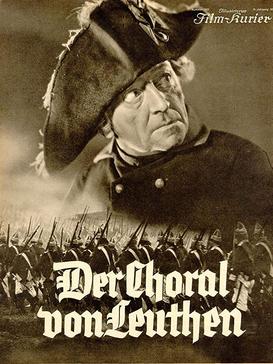
The Hymn of Leuthen is a 1933 German film depicting Frederick the Great, directed by Carl Froelich starring Otto Gebühr, Olga Chekhova and Elga Brink. It was part of the cycle of nostalgic Prussian films popular during the Weimar and Nazi eras. The title refers to the 1757 Battle of Leuthen.

Vladimir Georgievich Gajdarov was a Russian film actor and star of Russian and German silent cinema.
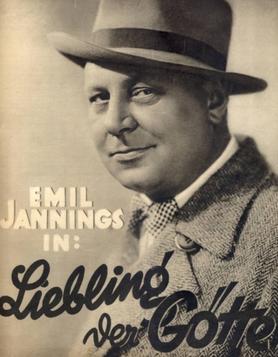
Darling of the Gods is a 1930 German musical drama film directed by Hanns Schwarz and starring Emil Jannings, Renate Müller and Olga Chekhova. Jannings had recently returned from Hollywood where the arrival of sound films had harmed his career. The film was made at the Babelsburg studios, and based on the play Die Tokaier by Hans Müller. It was made by Erich Pommer's production unit, part of the German Major film studio UFA. It premiered at the Gloria-Palast in Berlin on 13 October 1930.

Nora is a 1923 German silent drama film directed by Berthold Viertel and starring Olga Chekhova, Carl Ebert and Fritz Kortner. It is an adaptation of the 1879 play A Doll's House by Henrik Ibsen. It premiered in Berlin on 2 February 1923. The film's art direction was by Walter Reimann.
The Prince of Rogues is a 1928 German silent drama film directed by Curtis Bernhardt and starring Hans Stüwe, Lissy Arna and Albert Steinrück. It was shot at the Johannisthal Studios in Berlin. The film's art direction was by Heinrich Richter. The story depicts the life of the 18th century outlaw Schinderhannes. It is based on a 1927 play Schinderhannes by Carl Zuckmayer.
The Wife of Forty Years is a 1925 German silent drama film directed by Richard Oswald and starring Diana Karenne, Vladimir Gajdarov and Sig Arno. The film's art direction was by Paul Leni.

The Trial of Donald Westhof is a 1927 German silent crime film directed by Fritz Wendhausen and starring Oskar Homolka, Karin Evans and Imre Ráday. It was shot at the Babelsberg Studios in Berlin. The film's sets were designed by the art director Robert Neppach. It premiered at the Ufa-Palast am Zoo in Berlin. Produced by UFA, it was distributed as part of the Parufamet agreement.

The White Slave is a 1927 German silent drama film directed by Augusto Genina and starring Liane Haid, Vladimir Gajdarov and Harry Hardt. The film's sets were designed by Otto Erdmann and Hans Sohnle.
The Country Schoolmaster or Country Schoolmaster Uwe Karsten is a 1933 German drama film directed by Carl Heinz Wolff and starring Hans Schlenck, Marianne Hoppe and Heinrich Heilinger. It was remade in 1954.

The Concert is a 1931 German comedy film based upon the play by Hermann Bahr, directed by Leo Mittler and starring Olga Chekhova, Oskar Karlweis, and Ursula Grabley. It was made by the German subsidiary of Paramount Pictures and released by UFA as part of the Parufamet distribution deal. It was shot at the Joinville Studios in Paris and premiered at the Gloria-Palast in Berlin.

Aftermath or Burning Border is a 1927 German silent drama film directed by Erich Waschneck and starring Jenny Hasselqvist, Hubert von Meyerinck and Fritz Alberti. It is noted for its generally anti-Polish tone. It was made at the Terra Studios in Berlin in late 1926. The film's sets were designed by the art director Alfred Junge.
The Holy Lie is a 1927 German silent film directed by Holger-Madsen and starring Otto Gebühr, Margarete Schlegel, and Paul Bildt.

Regine is a 1935 German drama film directed by Erich Waschneck and starring Luise Ullrich, Anton Walbrook and Olga Chekhova. It was shot at the Grunewald Studios in Berlin. The film's sets were designed by Otto Erdmann and Hans Sohnle.

Artist Love is a 1935 German historical drama film directed by Fritz Wendhausen and starring Inge Schmidt, Wolfgang Liebeneiner and Olga Chekhova.

Grandstand for General Staff is a 1926 Austrian-German silent comedy film directed by Hans Otto and Erich Schönfelder and starring Alexander Roda Roda, Harry Liedtke and Olga Chekhova. It is based on a play of the same name.
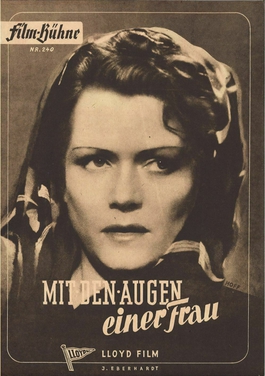
With the Eyes of a Woman is a 1942 German drama film directed by Karl Georg Külb and starring Ada Tschechowa, Olga Chekhova and Gustav Fröhlich.
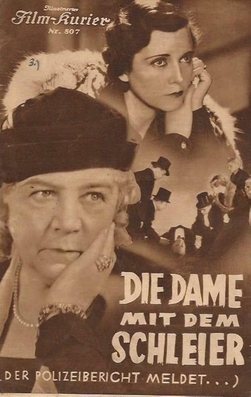
Police Report is a 1934 German mystery crime film directed by Georg Jacoby and starring Olga Chekhova, Paul Otto and Hansi Niese. It was adapted from the 1932 novel Die Frau im schwarzen Schleier by Hedda Lindne.

Ways to a Good Marriage is a 1933 German drama film directed by Adolf Trotz and starring Olga Chekhova, Alfred Abel and Hilde Hildebrand. It was shot at the EFA Studios in Halensee in Berlin. The film's sets were designed by the art directors Heinz Fenchel and Botho Hoefer. The film was based on the ideas of the sexologist Theodore H. Van de Velde and was in the tradition of the enlightenment films of the Weimar Republic. Although his work had already been forbidden by the new Nazi regime, it was not formally banned until 1937 despite protests by Nazi students in Kiel who were successful in having the film pulled from cinemas there.
















